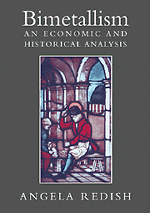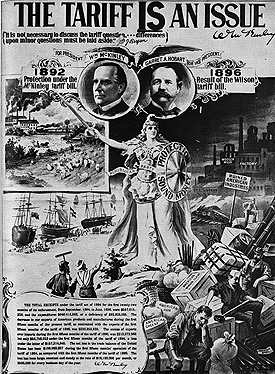Bimetallica
 This post concludes, at least for now, an ad hoc series based on my participation in the University of Nebraska's reconsideration of William Jennings Bryan.
This post concludes, at least for now, an ad hoc series based on my participation in the University of Nebraska's reconsideration of William Jennings Bryan.The Democratic Party nominated Bryan for President three times, in 1896, 1900, and 1908. In the first of those campaigns, the Populist Party also nominated Bryan; its substitution of Tom Watson for Arthur Sewall as Bryan's running mate was too weak a gesture to sustain a distinct identity and viable political future for the junior partner among the "Popocrats." Given how miserably Bryan failed at the one federal job he did hold (Secretary of State under President Wilson), it's probably a very good thing that Bryan never won the Presidency. He would have been worse at governing than he was at winning elections.
The legacy of the 1896 campaign, however, endures. Bryan's charisma and energy met their match in the shrewdness of Mark Hanna, William McKinley's campaign manager and (for all practical purposes) the inventor of the modern campaign. Bryan unleashed political energy of an intensity that would not be seen until after his death and is rarely encountered today.
 In all of this, what gets overlooked is bimetallism, the central policy dispute in the 1896 campaign. Although bimetallism is carefully scrutinized by historians and economists, legal scholars have paid it almost no heed. Yet again, it behooves us to conduct economic analysis of law as if it mattered.
In all of this, what gets overlooked is bimetallism, the central policy dispute in the 1896 campaign. Although bimetallism is carefully scrutinized by historians and economists, legal scholars have paid it almost no heed. Yet again, it behooves us to conduct economic analysis of law as if it mattered.Bimetallism may have been a political flash in the pan, but it illuminates a fundamental purpose of the Constitution and the United States government. As a specific policy, Bryan's proposal to circulate silver-backed currency at a 16:1 ratio to gold-backed notes was a crude and obsolete tax policy. It echoed colonial-era battles between farmers and bankers. “Cheap” money invariably has winners and losers. Entrepreneurs and speculators and, yes, farmers all stood to gain. Bankers and other vested interests stood to lose. Politically, the 16:1 plank proved costly. Bimetallism cost Bryan the support of urban immigrants from German-speaking countries, who held the balance of electoral power in the fiercely contested Midwest. All this and more, I think, flows from a fair reading of Michael Kazin's new biography of Bryan.
 But bimetallism’s veneer concealed wise policy. A quick post on Jurisdynamics is hardly the place to defend a proposition of this magnitude, but I believe that the Constitution is best understood not through the lens of federalism, separation of powers, or individual rights and civil liberties, but rather through the problem of public finance. Government revenue is the true constitutional touchstone. For this reason I very much admire Mark Kelman's landmark law review article, Could Lawyers Stop Recessions? Speculations on Law and Macroeconomics, 45 Stan. L. Rev. 1215 (1993), and have devoted a substantial bit of my own research efforts toward the measurement and use of inflation in the law.
But bimetallism’s veneer concealed wise policy. A quick post on Jurisdynamics is hardly the place to defend a proposition of this magnitude, but I believe that the Constitution is best understood not through the lens of federalism, separation of powers, or individual rights and civil liberties, but rather through the problem of public finance. Government revenue is the true constitutional touchstone. For this reason I very much admire Mark Kelman's landmark law review article, Could Lawyers Stop Recessions? Speculations on Law and Macroeconomics, 45 Stan. L. Rev. 1215 (1993), and have devoted a substantial bit of my own research efforts toward the measurement and use of inflation in the law.The United States government of Bryan's time depended heavily on tariffs as its chief source of revenue. This dependency came at a stiff price. Tariffs shelter entrenched interests and deter foreign competitors from challenging domestic industry. The resulting distortions in productivity and the distribution of wealth and income are outrageous. Bryan's quixotic embrace of silver opened the door to two things. First, the federal government needed to find some sort of tax-based system of finance in place of the tariff. Second, the shift to tax-based rather than tariff-based finance would enable the government, through the vastly more efficient if still imperfect mechanism of progressive (or at least degressive) income taxation, to achieve distributional goals utterly unthinkable in the age of tariffs, tight money, and rule by trust.
Bryan famously lost every Presidential battle he waged, and his bimetallism platform might well have performed as disastrously as his opponents warned. But his political career enabled the America of Pollock v. Farmers' Loan & Trust Co. to adopt a simple formula that is part of our nation's economic declaration of independence:
The Congress shall have power to lay and collect taxes on incomes, from whatever source derived, without apportionment among the several States, and without regard to any census or enumeration.












2 Comments:
Bryan's cheap-money platform actually prevailed, though not through the mechanism he endorsed. The opening up of the Klondike gold fields flooded the international commodity markets with a substantial influx of gold, leading to substantially the increase in the money supply that a bimetallic system would have generated.
Government revenue is the true constitutional touchstone. You'll definitely want to check out John Brewer's excellent book, The Sinews of Power, which also argues for the importance of the rise of taxation in the formation of the modern British state.
Post a Comment
<< Home